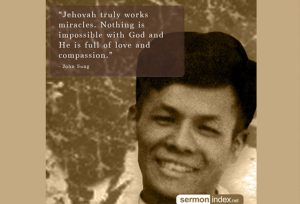- Home
- People + Places
- God’s Battle Axe – John Su ...

In this edition, we are honouring the memory of one of the unique prophetic voices of the 20th century, John Sung. He operated as a true apostolic evangelist, with countless signs and wonders following his ministry. Sung epitomises that rare combination of New Testament purity and power. A genuine prophetic anointing powerfully marked his life and ministry. He was the embodiment of burning zeal, unquenchable passion and an unrelenting fearlessness. Some people called him the “John Wesley of China”, while others referred to him as “the Ice-Breaker” or the “Apostle of Revival.” Those who witnessed or studied his ministry consider him one of the greatest revivalists of the 20th century.
Sung was born on September 27, 1901 in Hinghwa of the Fukien province in Southeast China. He was the son of a respected Methodist minister and was born again at age nine. He left for America to further his studies at Wesleyan University, Ohio when he was 19 years old. From there, he attended Union Theological Seminary, also in Ohio. Within five years and two month from the day he entered college, he earned three academic degrees: Bachelor of Science, Master of Science and Doctor of Philosophy, all while doing menial labour on a full time basis.

However, these high honours took a great toll on his spiritual life. After a few years in America, sitting under a steady diet of worldly philosophy and liberal theology, Sung found himself backslidden and doubting everything his father had thought him.
On February 10, 1927, around the same time revival started to break out in China, he recommitted his life to the Lord Jesus Christ. This was just the beginning of a much deeper work. After repenting of his sins, he was suddenly filled with inexpressible joy. He immediately began to preach to all his classmates and professors. This drastic change in Sung’s behaviour made some believe that he had become mentally unbalanced. He soon found himself being committed to an insane asylum by the seminary authorities. He was allowed to take with him only his Bible and his fountain pen. Sung would later refer to that asylum as his true theological seminary. He was incarcerated for 193 days, a little more than six months.
During that time, he read the Bible from the beginning to end forty times. He devoted almost every waking hour to reading the Bible and prayer. Through those months of solitude, the Holy Spirit was carefully laying the foundation for his revival ministry. He was being prepared to participate in one of the mightiest revivals of the 20th century.
After his discharge from the mental hospital, Sung returned to China in October 1927. In spite of all the possible opportunities that his education could afford him, he was determined to preach the gospel to his people. Sung realised that what China needed most was not more science teachers but preachers of the gospel. One day as the ship conveying him to China neared its destination, he gathered up all his degree certificates, medals and fraternity keys and threw them overboard into the ocean. The only exception was his doctorate degree certificate, which he kept only for the benefit of his father. Like Paul the apostle, Sung could say, “What things were gain to me, these I have counted loss for Christ.” (Philippians 3:7).

However, these high honours took a great toll on his spiritual life. After a few years in America, sitting under a steady diet of worldly philosophy and liberal theology, Sung found himself backslidden and doubting everything his father had thought him.
On February 10, 1927, around the same time revival started to break out in China, he recommitted his life to the Lord Jesus Christ. This was just the beginning of a much deeper work. After repenting of his sins, he was suddenly filled with inexpressible joy. He immediately began to preach to all his classmates and professors. This drastic change in Sung’s behaviour made some believe that he had become mentally unbalanced. He soon found himself being committed to an insane asylum by the seminary authorities. He was allowed to take with him only his Bible and his fountain pen. Sung would later refer to that asylum as his true theological seminary. He was incarcerated for 193 days, a little more than six months.
During that time, he read the Bible from the beginning to end forty times. He devoted almost every waking hour to reading the Bible and prayer. Through those months of solitude, the Holy Spirit was carefully laying the foundation for his revival ministry. He was being prepared to participate in one of the mightiest revivals of the 20th century.
After his discharge from the mental hospital, Sung returned to China in October 1927. In spite of all the possible opportunities that his education could afford him, he was determined to preach the gospel to his people. Sung realised that what China needed most was not more science teachers but preachers of the gospel. One day as the ship conveying him to China neared its destination, he gathered up all his degree certificates, medals and fraternity keys and threw them overboard into the ocean. The only exception was his doctorate degree certificate, which he kept only for the benefit of his father. Like Paul the apostle, Sung could say, “What things were gain to me, these I have counted loss for Christ.” (Philippians 3:7).

When Sung was not actively preaching or organising a new evangelistic team, he usually could be found writing in his diary or adding to his ever growing prayer list. He carefully prayed over an extensive list of people’s needs, which was accompanied by dozens of small photographs. He was a faithful intercessor and always requested a small picture of those desiring prayer in order to help him intercede with a deeper burden. Everywhere he went, he urged the people to give themselves to prayer. The fact that the Chinese Church is a praying church today, can be attributed in part to the influence and example of this man who prayed. Nothing was allowed to hinder his time in prayer. Sung made it his regular habit to be up every morning at 5 am to pray. Prayer for him was like a battle. He prayed until the sweat poured down his face. At times he would literally collapse upon his bed and weep uncontrollably under the burden of travailing prayer. Sung believed that prayer was the most important work of the believer. He defined faith as watching God work while on your knees. He talked least, preached more and prayed more.

Because it was evident, that Sung was a man of great power in prayer, the sick and the crippled came to him to receive prayer for their bodies. He always made time to tenderly pray for their needs. He usually had one meeting in every campaign at which he would give an address on healing and the necessity for sincere repentance before inviting the sick to come forward. Hundreds were instantly healed of every kind of ailment and disease. The blind received their sight; the lame walked, and the deaf and mute were wonderfully healed as Sung cried out to Jesus in prayer.
Sometimes he would personally lay hands on and pray for as many as 500-600 people at one time. In spite of the fact that so many marvellous healings followed his ministry, he suffered for years from tuberculosis. This disease consistently plagued him with painful and infected bleeding ulcers in his colon. Nevertheless, he continued to preach the gospel fervently, sometimes in a kneeling position to lessen the terrible pain. Finally after years of suffering with this affliction, he died at age 43, on August 4, 1944.
What God used His son, Sung to achieve in China was phenomenal. Because the Holy One of Israel is the same yesterday, today and forever, we believe that He would accomplish similar feats in our respective nations if we yield ourselves to Him. Believers in the 21st century have been given much more than Sung and his peers had in previous centuries. We have access to technologies they did not even dream about, including things that can facilitate intercession and preaching of the gospel. For instance, we can reach people in distant lands through the worldwide net, especially social media platforms. We do not have any excuse for not preaching the gospel or interceding for unsaved souls everywhere. Let us remember that God would ask us to account for all these resources; for “To whom much is given, much is expected.” (Luke 12:48).
**** Culled from John Sung, https://www.revival-library.org
